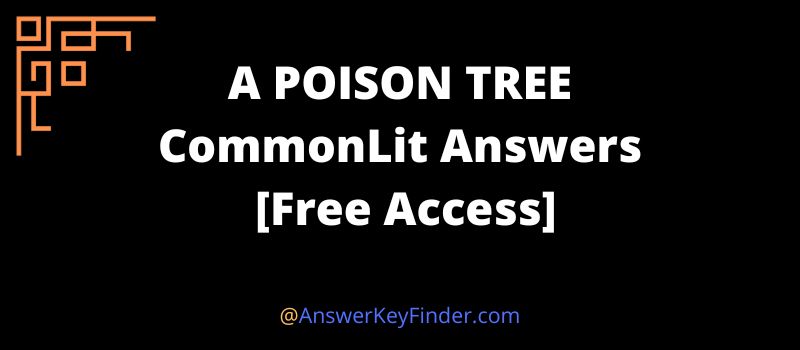In this session, we will be revealing A POISON TREE CommonLit answers which are absolutely FREE to view.
Before publishing, every answer for A POISON TREE CommonLit short story undergoes a thorough review to ensure its accuracy & reliability. If you find them helpful, please don’t hesitate to share.
A POISON TREE CommonLit Answers – FREE Access
Find the answer key for the topic “A POISON TREE” below:
Note: Be prepared to share your original ideas in a class discussion.

Discussion Questions & Answers
Following are our answers based on the questions provided:
Q.1. Why do you think the speaker tells their friend that they are angry with them but does not tell their enemy? Have you ever been in a similar situation and, if so, how did you behave? Why?
Ans: The speaker told their friend because of their relationship with each other is something that the speaker does not want to break and the speaker could care less about their enemy’s feelings.
I have been in this situation before, I will tell my friends about something that they did that angered me but I will keep it to myself for some time to better reevaluate my emotions so I can discuss this with them in a calm collected manner. With my enemy I did the same except for the telling them part, I don’t speak to my enemies only if I really need to, I just decide to either be petty about it or hold a grudge or forgive them without them knowing.
Q.2. Consider the consequences of the speaker’s actions. What is Blake trying to convey about anger and emotion in this poem? What could have prevented or changed the conclusion of this poem?
Ans: He is trying to say that keeping in your feelings like anger will get worse or grow, to at least relieve some tension is to release these feelings and express them. The speaker telling his anger to his enemy would have prevented and changed the conclusion of the poem about the enemy’s death.
Q.3. In the context of this poem, is revenge ever justified? If so, when? Is the speaker’s act of revenge in this poem justified? Cite evidence from this text, your own experience, and other literature, art, or history in your answer.
Ans: I don’t think any act of revenge is justified and it usually ends not like how we thought it would and it can turn up very unsatisfactory than we expected it to be. I also believe taking up the responsibility of being the bigger person and forgiving someone is better than lashing out at them to serve your sweet cold on a platter of revenge. Although I don’t think revenge is justified at all in this situation where the enemy is provoking the speaker by stealing a fruit from the tree the speaker grew is his own fault. If he did not pick the fruit he would not have been affected at all.
Assessment Questions & Answers
Following are our answers based on the questions provided:
Q.1. PART A: Which of the following best describes a major theme of the poem?
Ans: Bottling up one’s feelings leads to resentment and even violence.
Q.2. PART B: Which of the following quotes best supports the answer to Part A?
Ans: “I was angry with my foe: / I told it not, my wrath did grow.” (Lines 3-4)
Q.3. How do the speaker’s actions in the first stanza provoke action in the poem?
Ans: The speaker does not express their anger to their foe, and because of this, their anger worsens until it eventually grows into a poisonous tree.
Q.4. What impact does the figurative language in lines 5-8 have on the poem’s meaning?
Ans: The speaker tends to their wrath like a plant that later produces a poisoned fruit, implying that anger can feel satisfying but is toxic to let grow.
Q.5. How does the conclusion of the poem impact the poem’s theme?
Ans: The conclusion of the poem impacts the poem’s theme by revealing the consequences of suppressing or bottling up one’s anger. It suggests that when someone keeps their anger inside without expressing it in a healthy way, it can eventually lead to violence. This conclusion adds depth to the theme of the poem, emphasizing the importance of addressing and managing emotions effectively rather than letting them build up and potentially cause harm.
You can find answer keys for other grade 10 topics below:
=> SCREEN ADDICTION AMONG TEENS
Note: In case, you have anything to share related to this topic let us know through the comment box below.
Conclusion
In CommonLit, “A POISON TREE” is one of the students’ favorite articles authored by William Blake for grade 10 students.
The poem explores the theme of anger and its consequences.
Hope you got A POISON TREE CommonLit Answers Key for free as promised. Share with your batchmates if you find this helpful.
Hi, I’m Annie Smith, and I’ve been a teacher for over 5 years and have taught students at all levels. I love to help students get ahead of their exams and provide helpful guides on various topics.
